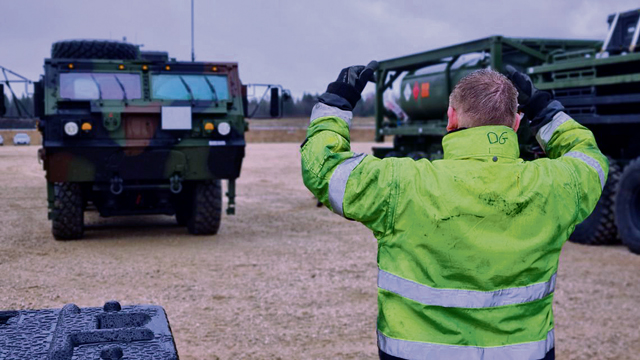
TAPA, Estonia — DEFENDER-Europe 21 involves about 28,000 U.S., NATO and partner militaries from 26 nations conducting live fire exercises, airborne operations, missile defense activities and a multitude of complex, bilateral operations simultaneously.
To outfit an operation of this scale requires a lot of equipment. Several hundred pieces of equipment were shipped to Europe from the U.S. by cargo vessel, but over 1,000 pieces were drawn from the 405th Army Field Support Brigade’s Army Prepositioned Stock-2 sites here in Europe.
Rhona Habets, a heavy wheeled vehicle mechanic foreman at the APS-2 site in Eygelshoven, Netherlands, said her team helped to prepare all the vehicles for movement to Estonia, to include getting the vehicles certified by German inspectors for transport across international borders.
“They are inspected by the Germans because they have the strictest regulations in Europe,” said Habets. “And they are tough – the toughest in Europe.”
Once in Estonia, Maj. Sherry Childs said the team from the 405th AFSB’s Army Field Support Battalion-Benelux immediately went into action.
“Everyone showed up and started working, downloading trucks, setting up expandable container workspaces, getting connectivity set up and getting the vehicles staged by type,” said Childs, the AFSBn-Benelux Support Operations officer in charge. “Once we had accountability of all the equipment, they started loading all the secondary items and staging by unit identification code.”
But the work didn’t begin in Estonia. Childs said when she arrived at AFSBn-Benelux in January of last year – within two months of her arrival the planning was underway, and it never slowed down.
“We were actually still receiving equipment right up until the last minute, conducting maintenance on this equipment and turning this equipment around very quickly to issue it here,” said Childs.
“You have to react quickly with the U.S. Army, but it makes it more challenging and I like a good challenge,” said Habets, a Dutch local national employee with the 405th AFSB’s AFSBn-Benelux.
Joshua Steinlicht, also assigned to AFSBn-Benelux, is the Equipment Configuration Handling Area chief, at Tapa Barracks, Estonia. He said it takes a lot of work to set up a successful ECHA – meeting all the planning goals, getting the equipment on site, getting everything placed on the issue grid and establishing the configuration for combat.
“It’s important for us because it’s our primary mission as an APS site,” Steinlicht said, “Making sure all this equipment is 100 percent mission capable and ready so the Soldiers participating in the exercise can take the equipment out, use it and successfully accomplish their mission.”
“It’s important that they can focus on training and not have to worry about maintenance too much,” said Steinlicht, a retired Forward Support Company first sergeant.
Army Private Ricardo Jofre is a Forward Support Company supply clerk with 1st Battalion, 508th Parachute Infantry Regiment, 82nd Airborne Division. He and his unit are on the receiving end of all the planning and preparation that went into getting the APS-2 vehicles and equipment effectively configured and placed at the ECHA in Estonia.
“I thought it was pretty crazy. It was more than I expected,” Jofre said. “We arrived by plane carrying everything on our backs and fell onto all this gear – transport trucks, fuel trucks, water trailers, Humvees, generators.”
“It’s better that we are able to receive the equipment here and turn it in when we leave since we are only scheduled to be here for about three weeks,” said Jofre.
Army Sergeant 1st Class Roberto Ortiz is the Support Operations maintenance manager for AFSBn-Benelux, 405th AFSB. He said in order to pull off a mission of this scale and magnitude it takes a total team effort. For AFSBn-Benelux in Estonia, the team is made up of Dutch local national mechanics and maintainers, U.S. Army civilian employees, Army officers and noncommissioned officers.
“From a maintenance point of view, NCOs bring experience,” said Ortiz, who has served in the Army for over 19 years. “Our workforce is mainly Dutch — and a lot of stuff gets lost in translation — so I’m here to help them interpret what the Army regulations and manuals state.”
Army Sergeant 1st Class Daneya McMillon, the senior enlisted advisor for AFSBn-Benelux, said “Exercises like this provide us with real-world scenarios where we can come out and work with multiple forces from multiple backgrounds.”
“It makes us work together stronger, and in unison,” McMillon said. “And that’s what I strive to maintain here as the senior enlisted advisor for our battalion — that we work in unison and that we work as a team, as a family.”
Steinlicht said the team from AFSBn-Benelux is completely dedicated and committed to successfully making this exercise happen, and McMillon said the exercise has enhanced her knowledge and helped the unit perform better as a team.
“We are very well organized and able to accomplish pretty much any task, regardless of how hard it is,” Steinlicht said.
“Ultimately that’s our job,” said Childs. “The Soldiers who are going to use the equipment are going to be putting their lives on the line, so it’s not just about the equipment. It’s about protecting the lives of the Soldiers using it.”
The 405th AFSB is assigned to U.S. Army Sustainment Command and under the operational control of the 21st Theater Sustainment Command, USAREUR-AF. The brigade is headquartered in Kaiserslautern, and provides materiel enterprise support to U.S. Forces throughout Europe and Africa — providing theater sustainment logistics; synchronizing acquisition, logistics and technology; and leveraging the U.S. Army Materiel Command materiel enterprise to support joint forces.
For more information on the 405th AFSB, visit the official website at www.afsbeurope.army.mil and the official Facebook site at www.facebook.com/405thAFSB.


